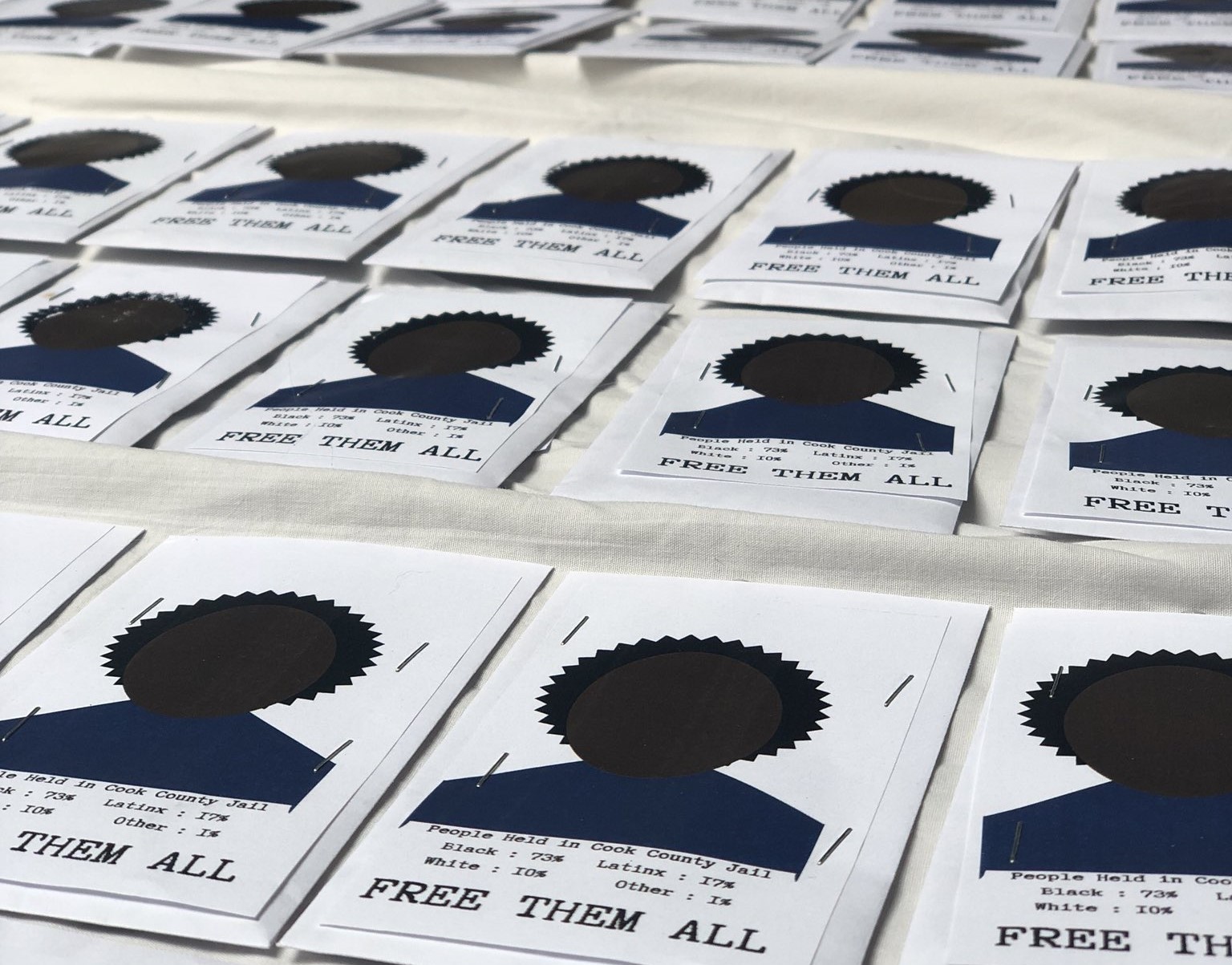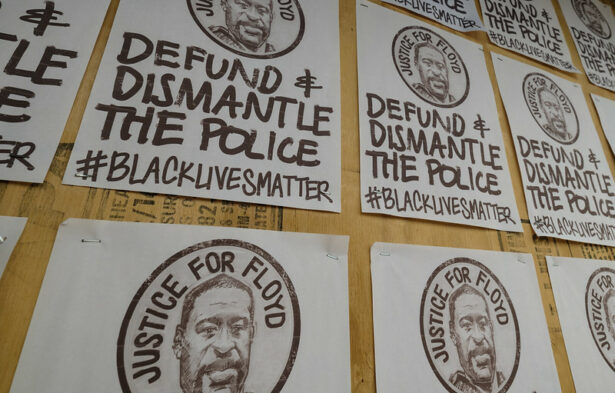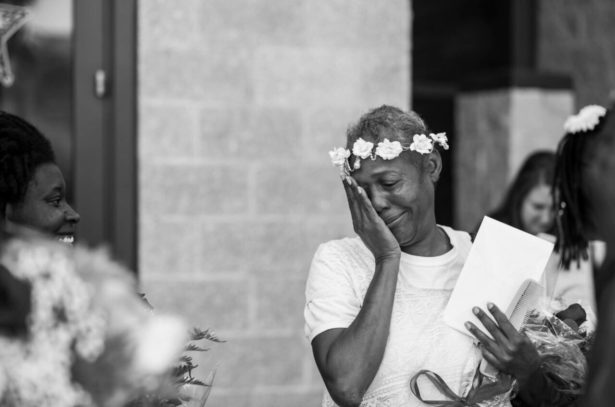How bail funds are fighting new legal attacks on solidarity
This article How bail funds are fighting new legal attacks on solidarity was originally published by Waging Nonviolence.

As local and state governments across the country wrestle with cash bail as a tool for combating violent crime and suppressing protests, bail regulations have become a focal point in the struggle between pro-police advocates and grassroots movements to transform the criminal-legal system. Since February, community organizers and nonprofits across the country are decrying a new Georgia bill that heavily restricts so-called “charitable bail funds.”
Senate Bill 63 was sent to Gov. Brian Kemp in early April after passing in the state legislature. The bill mandates that no individual or organization in Georgia can post more than three cash bonds per year — effectively criminalizing community bail funds — while increasing the number of criminal offenses that require cash bail. It also requires that churches and nonprofits that post bail be regulated like bail bond companies: “passing background checks, paying fees, holding a business license, securing the approval of the local sheriff and establishing a cash escrow account or other form of collateral.”
Three organizers with the Atlanta Solidarity Fund were named in last year’s RICO indictment against the Stop Cop City movement, which alleges the fund committed money laundering and charities fraud. In a statement released on social media, the fund argued that this indictment was meant “to shut down the social movement currently taking place in Atlanta, and to send a message that anyone advocating for social change could be a target.” But Georgia’s recent bill is also part of a broad wave of reactionary attacks on bail funds that’s been escalating over the past 15 years.
Since 2021, a number of states have proposed similar restrictions, including Idaho, Virginia and Washington, sometimes tucked within larger crime bills. Other states have focused on making bail regulations more punitive in as many cases as possible. In Tennessee, for example — where Republicans have repeatedly claimed that progressive bail reform enables violent crime — a newly-passed bill prohibits judges from considering a defendant’s ability to pay when determining bail amounts, while a proposed constitutional amendment would let judges deny bail for a wider range of criminal offenses.
These ongoing policy struggles have become a key issue for the National Bail Fund Network, or NBFN, an information sharing and fundraising hub that includes more than 90 community bail funds across the country. I recently spoke to NBFN Director Pilar Weiss, an experienced organizer who worked in labor, electoral and abolitionist spheres before founding the network in 2016. We talked about the past attacks on community bail funds that informed Georgia’s new bill, how bail funds fit within abolitionist struggle nationwide and how organizers are responding to the “criminalization of solidarity.”
What are some historical trends that can help folks understand Georgia’s attack on bail funds?
I think one of them is that there’s always been criminalization of mutual aid and solidarity and community care: It’s targeted the Black liberation movement, civil rights movement, American Indian movement and Chicano movement. That’s really important for all of us to keep in mind. There have been bail funds as long as people have been incarcerated — and at different points, there were attacks. The current intensification of the attack really started in 2012 in New York.
Starting in 2007, one of the public defender offices started a bail fund called the Bronx Freedom Fund — and they were posting bail for their clients. It elicited a bunch of backlash from judges who really didn’t like that open solidarity. Because of that backlash, New York passed a law regulating bail funds in 2012. That law has all the seeds for what is now being used in Georgia and many other states.
It created a term called a “charitable bail organization” — people didn’t call themselves [that], but New York created a definition so they could regulate and restrict what people could do. They said, if you are going to be a charitable bail organization, you can only pay for misdemeanors up to $2,000. People still collectivized paying money for people with felony charges at higher amounts, but if you were going to be a nonprofit organization that paid bail, you had to take on that definition and be regulated by the state.
Most people who run bail funds actually come at it from a “solidarity, not charity” model. They might be a 501(c)3 for tax purposes, but the roots of community bail funds are incredibly radical. By creating a new regulatory entity, by limiting the kind of charges that they can pay, by limiting the amounts, by creating barriers to who’s allowed to be in the definition, you can criminalize people for not following the regulation.
How did you get interested in bail funds as a tactic, and what was the impetus for starting the NBFN?
There was a wave of bail funds being a tactic that people were coming back to or coming to fresh around 2014-2015. I think part of it was Kalief Browder’s suicide, exposure of the tragedy of why he had been incarcerated and in solitary for so long. Bail was [a] lever people were thinking about a lot: like, if we bail out a lot of people, reject the state’s attempt to hold people on monetary ransom, connect people and lift up their stories, that’s gonna be a powerful organizational tool toward decreasing detention. All of a sudden, there were a dozen or so bail funds across the country — and so a number of us were thinking, now that there’s a renewed interest, what if we had a network so we could start to learn from each other?
How did the strategic use of bail funds evolve as abolitionist demands became more mainstream?
Previous Coverage
 Making our demands both practical and visionary
Making our demands both practical and visionaryThere were some theories in that [2014-2015] phase where people were like, if we get out a lot of people, that’s gonna shock the system. By 2019, a lot of bail funds were like, “that theory of change did not work out.” You could bail out a lot of people and the system would incarcerate some more. They [were] really grappling with “reformist reforms,” and how the demand is to end pretrial detention, not to just end bail — and what does that mean for bail funds? They’re still gonna show up for their community [and] free people, but how is that part of a movement to end mass incarceration and abolish prisons?
During the first wave of COVID, when one of the most deadly places was being incarcerated, people were trying to get all kinds of compassionate release. In a lot of places, the only way to get people out was to bail them out. Some bail funds that were about to go dormant were like, “Oh no, we actually have to continue to exist because we’re the lifeline here.” Then the uprising happened in the summer. All of a sudden, people were watching people getting beaten up and arrested in Minneapolis after they had watched the murder of George Floyd. There was a huge surge in the amount of money that bail funds received in donations, which meant that they could bail out more people.
Kamala Harris [was] tweeting about giving money to bail funds, you had celebrities donating to bail funds — we had 3.5 million people donating to bail funds in one week at one point on a fundraiser we were doing. But it also increased their visibility and it became a right-wing attack trope. Then I think it becomes a repeat of the attacks that have always been on solidarity and community care: that really freaks out the right wing, who want to incarcerate and remove people.
What’s different or novel about this current phase of attacks on bail funds?
After the uprising in 2020, the escalation of attacks on bail funds and solidarity has been really fast. In 2021, there were six states that took parts of that New York charitable bail act and used it — a modification passed in Texas. Then in 2022 and 2023, there was another wave, where four states introduced laws to attack bail funds. In that little window, Indiana passed it. The American Legislative Exchange Council, or ALEC, was involved too: there was a template bill that was essentially a copycat of the New York bill that was being circulated.
Previous Coverage
 #FreeBlackMamas bails black mothers from jail for Mother’s Day
#FreeBlackMamas bails black mothers from jail for Mother’s DaySo in 2024, four states have introduced bills to go after bail funds — but they’ve been way harsher than the 2021 attacks. In Kentucky, there’s this really large “anti-crime” bill called HB5 that was vetoed by the governor, but the veto was overridden by the very conservative legislature. It increases all kinds of criminal charges — particularly for people who are houseless — and it also regulates bail funds and restricts what they can do. A bill that’s been introduced in Tennessee says that nobody can pay bail for a person unless they’re related to that person through blood, marriage or adoption. (It’s still pending.)
Of course, the Georgia bill has gotten momentum because of Cop City and the state’s continued attempts to crack down on any dissent around that — and the deep organizing and solidarity that multiple movements are showing to each other in Georgia. That part is exceptional. But it’s a longer arc.
Bail funds often serve two distinct functions: supporting protests and paying everyday bail bonds. Do you see a distinction between attacks driven by targeting protest movements versus everyday crime?
It’s a complicated question. I think the state (in a general sense) likes to divide people up — like, “We’re gonna just criminalize protesting on bridges because we think that’s ‘bad’; this isn’t about you people who are doing this other solidarity work.” That’s the attempt by the state to “other” people and create “the good movement” and “the bad movement.” So our approach has been to not take that bait. The power of the state to make people zero in on just this person’s fight, or just that group — and not connect the dots — is a universal challenge.

Waging Nonviolence depends on reader support. Make a donation today!
If a state passes a law and says, “we’re fine with bail funds, but we’re not fine with people who protest this [other] way,” that’s eventually gonna get used against everybody. We see this over and over again: A ton of people have written about this with gang databases and RICO charges. There’s been attacks on protesters in the environmental movement, with states passing laws about protecting “critical infrastructure” to go after pipeline protesters — but that then gets used against everybody. Or what’s happened post-Dobbs: The criminalization of reproductive choice and accessing abortion services can get used against people in all kinds of ways. Even in bluer states, if they’re falling into rhetoric around crime and changing laws about sentencing and charging and criminalizing people, that’s going to affect people across this movement.
How are local bail funds trying to intervene in these challenges when they show up?
Building local coalitions. Kentucky’s a wonderful example, because there was this really deep coalition that fought to get the governor to veto. It was this coalition of radical abolitionist groups and bail funds, pretty mainstream moderate groups and even some conservative groups — and the unifier was: “We don’t think we should be increasing incarceration and criminalization.”
People are very much talking with each other about how not to exceptionalize the moment. I think increasingly people are finding that it’s not about bail funds: It’s about the state wanting to criminalize community care, to remove any avenues towards freedom. There are attacks on abortion funds, attacks on Food Not Bombs; there’s many forms of solidarity that are being attacked. Sure, there’s gonna be unique things about bail, but the lesson is people situating and fighting back against the attacks on solidarity — and really naming that.
This article How bail funds are fighting new legal attacks on solidarity was originally published by Waging Nonviolence.
People-powered news and analysis
Source: https://wagingnonviolence.org/2024/04/how-bail-funds-fight-new-legal-attacks/
Anyone can join.
Anyone can contribute.
Anyone can become informed about their world.
"United We Stand" Click Here To Create Your Personal Citizen Journalist Account Today, Be Sure To Invite Your Friends.
Please Help Support BeforeitsNews by trying our Natural Health Products below!
Order by Phone at 888-809-8385 or online at https://mitocopper.com M - F 9am to 5pm EST
Order by Phone at 866-388-7003 or online at https://www.herbanomic.com M - F 9am to 5pm EST
Order by Phone at 866-388-7003 or online at https://www.herbanomics.com M - F 9am to 5pm EST
Humic & Fulvic Trace Minerals Complex - Nature's most important supplement! Vivid Dreams again!
HNEX HydroNano EXtracellular Water - Improve immune system health and reduce inflammation.
Ultimate Clinical Potency Curcumin - Natural pain relief, reduce inflammation and so much more.
MitoCopper - Bioavailable Copper destroys pathogens and gives you more energy. (See Blood Video)
Oxy Powder - Natural Colon Cleanser! Cleans out toxic buildup with oxygen!
Nascent Iodine - Promotes detoxification, mental focus and thyroid health.
Smart Meter Cover - Reduces Smart Meter radiation by 96%! (See Video).





